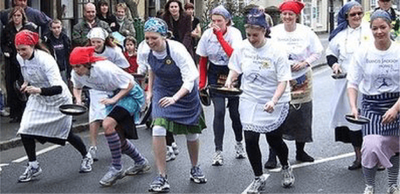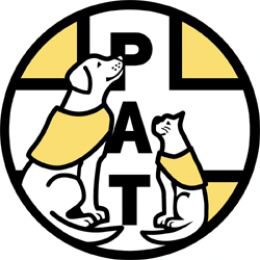|
Caring for a dog through the good and the bad times - It is always sad when any creature is coming to the end of its life. In the case of a dog dying it could be an animal that you have found after an accident, or your own beloved pet whose life is coming to an end. Whatever the circumstances, the role that you play in the animal's final days will be important.
So often a dog will not just quietly slip away in its sleep but rather YOU will have to make the choice to euthanize. Knowing that this is the right decision does not make it any easier. However before that stage of your pet's life you may have to care for a dog which is terminally ill. These days there are many options available to extend a pet's life comfortably, treat various life threatening conditions and keep a pet out of pain. If your dog has a terminal illness it does not necessarily mean that you have to euthanize it immediately. Instead you and your pet can enjoy what time there is left and make the right choice when it is appropriate. Bear in mind though that you must not extend the life of an animal that is suffering. Getting the right diagnosis Just like people dogs need to have the right medical diagnosis. You should never vaguely guess at what is going on with your dog's health or try to medicate the animal yourself without checking with a veterinary professional first. Before you visit the veterinarian try to think about the physical, mental and general health changes in your dog. Make a note of those that are relevant or new so that you will not forget any when you are in the surgery. Any or all of these could help your vet make the right diagnosis. Follow the Veterinarian’s Instructions Your vet may need to undertake tests or investigations of your pet before he or she can make a proper diagnosis. This can be expensive but is vital for your dog. Once a diagnosis has been made your vet may offer a few solutions. Depending on the animal's condition the vet may advise euthanasia. This will usually only be in severe cases. However, although you cannot be forced to make such a choice, the animal's well being must be paramount. Alternatively the vet may give your animal a course of treatment or even medication for life. This may not be easy and can be expensive. You must follow the vet's instructions though. If your animal needs its medication four times a day then that is what it must have. Unless you can offer the commitment necessary you are being cruel keeping a sick animal alive. Illnesses that could be the cause Dog's can suffer from various life threatening illnesses. Some are treatable whilst others will require ongoing treatment and TLC, tender loving care, until the dog's death. The vet will no doubt tell you when they have done all that they can. Your dog still may be quite comfortable but the prognosis will not be good. This is when you need to care for your animal appropriately until it is time to say your goodbyes. Such illnesses can be:
The dying animal If a dog is literally dying in your arms. there may be little you can do. If it is due to an accident the basics of first aid apply just as they do to a person. A veterinarian should be contacted at once so that treatment can be given. In the mean time keep the dog warm, calm and in a quiet environment if possible. When you have a dog as a pet that has a terminal condition keeping him comfortable will depend on many things. For example: If your dog has heart disease it would be cruel to keep it indoors all the time with no exercise. What you need to do is adjust your animal care routine. Adjusting your dog care routine On the whole it is all about being sensible. A dying dog may need more of your time, energy, thought and love but your pet is surely worth it, isn't it? However, it can be difficult. Consider:
Enjoy the time you have left Make sure that you and your pet enjoy the time that the dog has left. This will not always be possible but it is worth trying. Extra cuddles, strokes and love will help all of you. Know when it is time to say goodbye However much you prepare yourself for the death of your animal it will be hard. It is often just as hard for any other dogs that live with you. Consult your vet about how to make those final steps less traumatic for all concerned. Ideally, after loving and caring for your animal for so long, you want its death to be as painless as possible. Half the battle is knowing and admitting when it is time to say goodbye to your pet. A dog may live years with a life threatening condition, almost thriving on its medication. Suddenly out of the blue all of this could change. However hard it is, you must admit when it is no longer fair to keep your pet alive. There comes a time when to do so would be purely for selfish reasons. If you love your pet you have to let it go when the time is right. Often a pet will let you know when it is time, or simply your gut instinct will tell you. Listen to your heart and make the right choice. If you are in any doubt consult your veterinarian. You will need
Tips & Warnings
http://www.dailypuppy.com/articles/how-to-care-for-a-dying-dog_1552.html
1 Comment
Deciding whether to get a dog from a rescue centre, or not
So you have decided that you would like a little four-legged friend, namely a dog, to join your household? Even if you are looking for a specific breed of animal it may be worth checking out your local rescue centres. Believe it or not pedigree dogs do occasionally end up in a rescue centre needing a new home. However, it could be that the dog, pedigree or mongrel, is there because it has behavioural problems or more. Buying a dog from anywhere can be just as fraught with problems though. Even if you buy a puppy, if you are not 100% sure of its first home and parentage, you could be in for a bumpy ride. Personally I would recommend adopting or fostering a dog, or puppy, from a charity as all my rescued dogs have been so successful as pets. We did have one dog that was a slight disaster but he was a stray which we simply rescued from the streets and he did live with us for more than ten years. This woman has never wanted a pedigree dog but there are some fabulous cross-breeds out there if you are a little choosy. These dogs usually have great characters, better health in the long run and less hang-ups. When your new dog is adopted from a rescue centre though you have to accept that this dog will probably come with baggage, and I do not mean an overnight case. Depending on why the dog was in the rescue centre in the first place, the dog could be physically and mentally scarred. It may have been beaten, starved, maltreated in any number of ways or simply neglected. Unfortunately there are all too many sad stories of animal cruelty these days. If you are unsure about adopting a dog, from a rescue centre, you could always try fostering first. This would give you chance to have the dog with you, provide a temporary loving home and could ease the financial burden of having a pet. It can be hard to give up a foster dog though and maybe you would end up adopting after all. However, if you are unsure fostering can really help the rescue charity temporarily, and enable you to assess if a dog is really for you. Fostering sometimes is partially funded by the charity and therefore expensive veterinary bills will probably be paid for by them not you. Remember that when you adopt a dog from a charity there will be some sort of fee and it may be more than you would expect. However this is necessary to prove your commitment to the animal. Finally never discount an older dog. The dog may only be in the rescue centre because its owner has died or had to go into permanent residential care. This could mean that the dog is fully trained and well-behaved but also sorely missing his or her previous owner and home comforts. Sure, you may want a puppy, but I have to say that the dogs we have taken in have all been between one and five-years-old and have all been little darlings. Well most of the time. Dog Rescue Charities in the UK There are many dog rescue charities around the country. Of course it makes sense to search for your new dog with a rescue service that is near to your home. This means that it will be easy to visit the centre, call back if you have problems and is just generally a more sensible idea. The Internet offers lots of information about dog rescue charities, far and wide. Traditionally, in England the RSPCA re-homed dogs however, as animal welfare is such a problem in the UK these days, there are now many smaller charities all over the country. Consider offering your help in other ways, such as dog walking, donations or offering your help at the charity's sales and fairs for example. Hints and Tips
Well get to it! This story is not new but it may be to you. Read it and make the necessary consumer choices to help end this cruelty.
Does mankind have no end to its animal cruelty? Just when you think you have heard and read it all, along comes another harrowing tale. Thank you PETA for bringing this cruelty to our attention: The attached video makes grim viewing. If you feel that you are still happy to buy Down products make sure that you watch it. Please do all you can to make sure such cruelty is stopped. Boycotting Down products is a good place to start. "The cold-hearted and cruel down industry often plucks geese alive in order to get their down - the soft layer of feathers closest to a bird's skin. These feathers are used to produce clothing and comforters, but for geese, the down industry's methods are anything but comfortable. Undercover video footage shows employees on goose farms pulling fistfuls of feathers out of live birds, often causing bloody wounds as the animals shriek in terror. The frightened animals are often squeezed upside down between workers' knees during the painful procedure—in one instance, an investigator photographed a worker who was sitting on a goose's neck in order to prevent her from escaping. Live plucking causes birds considerable pain and distress. Once their feathers are ripped out, many of the birds, paralyzed with fear, are left with gaping wounds—some even die as a result of the procedure. Workers often sew the birds' skin back together without using any anaesthetics. That's not all—buying down can also support the cruelty of the foie gras and meat industries because many farmers who raise birds for food make an extra profit by selling their feathers as well. When these birds are slaughtered, they often have their throats cut or are dumped into tanks of scalding-hot water while they're still conscious. HOW YOU CAN HELP It's impossible to tell whether the down used in the products you buy was obtained from live-plucked birds. The only way to stop live plucking and ensure that no birds suffer for your clothing or bedding is to choose cruelty-free materials. Please make the compassionate choice to sign the pledge to go down-free now! If you haven't already done so, please share this information on Facebook and Twitter with everyone you know so that they, too, can make the compassionate choice to pledge to be down-free. You can also spread the word to everyone that you come in contact with by wearing "Down Hurts" merchandise! That way, everyone will know that the down industry abuses birds. |
Archives
September 2018
Categories
All
|

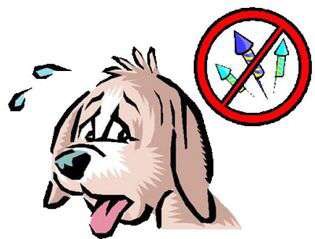

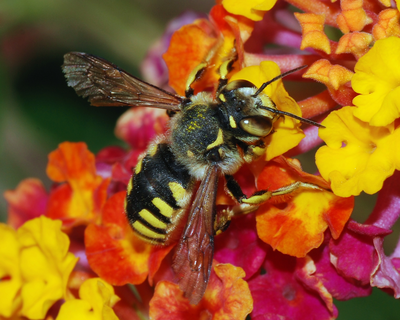





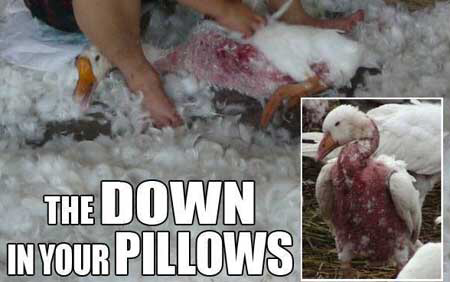


 RSS Feed
RSS Feed

